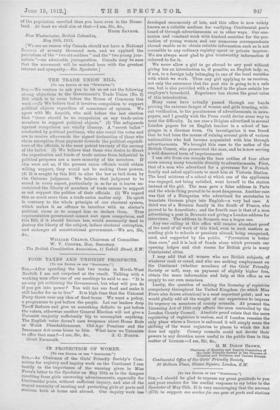THE TRADE UNION BILL.
[To THE EDITOR Or THE "SrEateron."] Stn,—We venture to ask you to let us set out the following strong objections to the Government's Trade Union (No. 2) Bill which is to come before the House of Commons this week :—(1) We believe that it involves compulsion to support political objects regardless of conscience of opinion. We agree with Mr. Asquith, who said before the last election that " there should be no compulsion on any trade-union members to support political objects." (2) The safeguards against compulsion are wholly illusory. A "secret ballot" conducted by political partisans, who also count the votes and are to receive afterwards the signed declaration of those who claim exemption from payment towards the political expendi- ture of the officials, is the most patent travesty of the secrecy of the ballot. (3) We believe that those who desire to divert the organization and funds of trade unions from industrial to political purposes are a mere minority of the members. If this were not so, if the present union officials could obtain willing support, they would not be seeking these powers. (4) It is sought by this Bill to alter the law as laid down by the Osborne judgment. We believe that judgment to be sound in every aspect, particularly in so far as it leaves un- restricted the liberty of members of trade unions to support or not support the politics of their officials. (5) We regard this as much more than a trade-union matter only. Its spirit is contrary to the whole principle of our electoral system, which makes it an offence to interfere with an elector's political views or to compel him to declare them. True representative government cannot rest upon compulsion, and this Bill, if it should become law, would necessarily tend to destroy the liberty of the subject, induce electoral corruption, and endanger all constitutional government. —We are, Sir,
c.,
WILLIADI CHANCE, Chairman of Committee. W. V. COOPER, Hon. Secretary.
The British Constitution. Association, 11 Tothill Street, S.W.










































 Previous page
Previous page